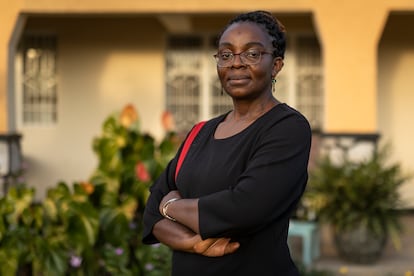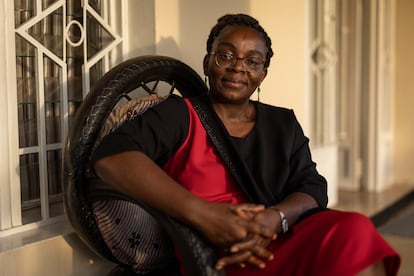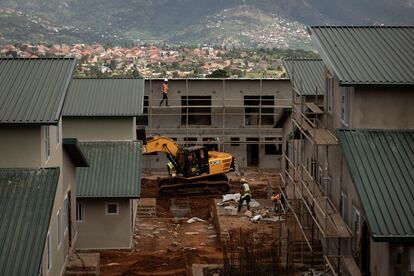‘The agreement with the United Kingdom creates a kind of modern slavery: I send you people I don’t want and I pay you for taking them’
Victoire Ingabire Umuhoza — the main political opponent of Rwandan President Paul Kagame — accuses her country’s government of ‘silencing opposition’ and focusing on ‘whitewashing its international image’


The walls of her living room in Kigali manage to show — without words — all the events that Victoire Ingabire Umuhoza has missed over the last 13 years: birthdays, graduation parties, weddings, baptisms… The faces of her three children are repeated in the photographs, revealing how much time has passed.
“Despite everything, this journey has been worth it,” the 55-year-old woman tells EL PAÍS (and probably herself), trying to shake off her nostalgia. The “journey” that she’s referring to began in 2010, when — after more than 16 years in the Netherlands — she returned to her country to register the Unified Democratic Forces (UDF) ahead of that year’s presidential elections. Three months later, she was arrested after giving a speech, charged with conspiracy and denial of the 1994 genocide, in which 800,000 Rwandans were killed by their own countrymen. She was subsequently sentenced to 15 years in jail. She spent eight years in prison — five of them in total isolation, “only with God and several books.” Thanks to a presidential pardon, she was released in 2018.
Today, Ingabire’s name is the first (and practically the only one) that appears when searching Google for “opponents of Rwandan President Paul Kagame,” who has been in power since 2000. The former prisoner hasn’t wavered in her determination to continue fighting for a place in the political space of her country, despite the fact that she lives under constant surveillance and is practically locked up in her house, which has a small flowery garden.
She’s almost never alone in her residence, which is where she receives EL PAÍS for an interview. The list of dead, disappeared and imprisoned collaborators and party comrades — which she can recite by heart — justifies her fear. Her cordiality is tinged by distrust; she feels fatigue every day. “Being in the opposition in Rwanda means not being able to do anything, having your hands tied,” she sums up.
Question. Even though you’re technically free, do you find yourself imprisoned within these four walls?
Answer. I was released and I have tried to move on with my life, but I only go out when necessary: to church, to the market, to visit people... I don’t travel at night and I never go alone, because it’s more difficult for something to happen to me if I’m accompanied. When I go somewhere, there’s a car or a motorbike from the government security services that follows me. Today, for example, they’re watching us from that building under construction, where they have a permanent surveillance post set up. There are always people near my front door, watching whoever is coming and going. And, once a month, I have the obligation to appear before the prosecutor.
Q. You can’t leave the country, either.
A. I haven’t left Rwanda since 2010. I would need authorization from the Ministry of Justice to do so. I have tried [to get it] three times: one of them was to go to Spain in 2019, to receive the award from the Association for Human Rights (APDHE). In the end, my children had to receive it on my behalf. I also asked permission to go to my eldest son’s wedding, but I had to watch it on the computer, in this room. I’ve asked the president to lift these restrictions, because it’s my right [to travel]. I’m waiting for his answer.
Q. There will be presidential elections in your country in 2024. Is there any chance that your party will be recognized and that you will be a candidate?
A. My new party, Development And Liberty For All (DALFA-Umurinzi), hasn’t been able to register. According to the Rwandan Constitution, I cannot run because I have been subject to a long prison sentence. But the African Court on Human and Peoples’ Rights (AfCHPR, based in Tanzania) found me innocent and, in 2017, it concluded that the Rwandan government had violated my right to freedom of expression and the right to have an adequate defense. [The court ordered Kagame’s government] to compensate me for the non-material damage suffered, a sentence that they haven’t complied with until today. The Rwandan government continues to consider me a criminal and uses [the justice system] to curb democracy and silence opponents.

Q. What’s the basis for accusing the government of silencing those who think differently?
A. In 2010, Bernard Ntaganda declared himself as a presidential candidate against Kagame — he was imprisoned for several years. In 2017, Diane Rwigara, an independent candidate, was arrested and charged with forging signatures for her candidacy. She was later acquitted. The only opposition that Kagame tolerates is the Green Party, which, in 2017, didn’t even get 1% of the vote. We will see what happens in 2024.
Q. You’re a well-known figure outside of Rwanda. For instance, in 2012, you were a finalist for the Sakharov Prize for Freedom of Thought from the European Parliament. Are you afraid of the coming months leading up to these elections, or do you think that notoriety and international solidarity protect you?
A. When I got out of prison in 2018, I had to appear before the attorney general’s office up to two or three times a week. They wanted to prevent me from speaking. I don’t know if [the security forces] will try to kill me. Right now, I don’t feel particularly threatened, although my assistant, Anselme Mutuyimana, didn’t feel threatened either, and in 2019, he got out of a bus, was forced into a car and his body was found a day later.
The list of opponents in Rwanda is getting shorter. People in charge of my party have been assassinated, disappeared or imprisoned: Jean Damascene Habarugira, Eugene Ndereyimana, Syldio Dusabumuremyi, Théophile Ntirutwa... At the moment, there are 16 members of my [political group] in prison, nine of whom haven’t been tried. I believe that all these [attacks] are messages for me. [The regime] stops at nothing, no matter how famous you are. But I’m going to continue asking for a dialogue to solve the problems of my country.
Q. However, internationally, Rwanda projects an image of reconciliation.
A. The reconciliation process has begun, but for it to be complete, all the victims of all the crimes must be recognized — the guilty must be brought to justice and the truth about what happened must be told. There have been terrible crimes against the Tutsis [the ethnic group that was victim of the 1994 genocide], but also against the Hutus.
Q. How would you achieve this?
A. I propose something like what was done in South Africa, with the creation of a Truth and Reconciliation Commission. First, we need to know what really happened in Rwanda from the October 1990 war to the year 2000. And then, justice has to come. Personally, I believe that a general amnesty should be considered, because there are people who have been punished and others who have not, especially ex-military members of the RPF (Rwandan Patriotic Front, Kagame’s movement, which brought an end to the genocide). The crimes committed by these people scare the government… I think that’s why they cling to power.
Q. The Rwandan government accuses you of denying the genocide.
A. That’s a lie. I don’t deny the genocide; I only tell the truth and the government doesn’t want to listen to it. I have presented them with reports from the UN, in which it is reported that [members of the RPF] killed [civilians], but the executive branch doesn’t want to talk about this. In any case, the accusation of denying the genocide is made against all opponents in Rwanda, to prevent them from tarnishing Kagame’s image.

Q. Your country has signed an agreement with the U.K. to receive asylum seekers from that country. What is your opinion of this deal?
A. I am totally opposed to it. The deal with the U.K. creates a kind of modern day slavery: I send you people I don’t want in my house and I pay you for [taking them]. It’s inhumane behavior on the part of the two governments. It totally violates the Geneva Convention, because refugees cannot be transferred to a country where they are threatened. Here, they will be [under threat], since we live with less rights, freedom and democracy than in the United Kingdom.
Rwanda is a country that has historically welcomed refugees. I think they should be welcomed here, but we are a small, overpopulated and poor country. How can our government commit to providing well-being to these people, if we cannot guarantee it to our own population? It’s a big lie. Rwanda already agreed to something similar with Israel in the past; it didn’t work. Now the government is also in negotiations with Denmark and the Netherlands. We will see [what happens].
It’s clear that the agreement with the United Kingdom was made for money, for prestige and to wash the international image of [Kagame’s] government. But it’s immoral to open the doors of the country to people, when you know that you’re not able to receive them correctly.
Q. You said goodbye to your children in 2010, thinking that you would be reunited in a matter of weeks. Since then, 13 years have passed. What do they have to say about this?
A. I have their full support and they believe — as do I — that this was necessary. But they’ve suffered a lot, of course. Me too. Now, at least they can visit me. My daughter came in 2020 with her family. My youngest son — whom I left behind [in Europe] at the age of eight — also came, as a full-grown man. I haven’t been able to see my eldest son, who lives in Sweden, since 2010. Neither has my husband, because he’s sick and can’t make this long trip.
These years have been hard for everyone. I hope to be able to leave in 2025, when my sentence expires. I will go visit my husband, but I will return to Rwanda, to continue fighting for its democratization. My place is here.
Q. Has this long journey been worth it?
A. Yes, it has been worth it. And it’s still going on. People continue to give me hope — more and more people dare to raise their voices and denounce the local authorities. I feel very supported and the government knows that I’m very popular. That’s why they can’t allow me to be a candidate. They say that I’m going to be elected only by the Hutus, because I’m a Hutu. But this isn’t true, I have many supporters among the Tutsis.
Q. It’s rare to find people like you in Rwanda, who continue to make the distinction between Hutus and Tutsis publicly.
A. Avoiding that topic is pure hypocrisy. At the genocide commemorations, when a child asks who killed the Tutsis, the answer is: “the Hutus.” Because that’s what happened. We’re a small country and we all know each other… although now we say that we are all Rwandans and nothing more. It’s all very well, but we know who’s who here.
Q. The Rwandan press has published harsh accusations against your mother, stating that she tortured and killed Tutsi women — especially pregnant women — during the genocide.
A. In 1994, I wasn’t in Rwanda. Since they can’t accuse me of anything, they try [to accuse] my mother. Coincidentally, they hadn’t invented anything about this until 2010, when I returned to the country. They have fabricated terrible rumors, saying that she killed a woman, that she stuck a knife into the belly of a pregnant woman. They want to present me as the daughter of a murderer, so that people don’t trust me. My mother is in the Netherlands and legally facing all of these insane accusations.
Q. Within Rwanda, how do you publicly refute this type of information published against you?
A. Rwandan journalists who still have some independence are afraid that something terrible will happen to them, or that they will lose their jobs if they come to see me. So, I have no contact with them. Their fear is justified; I understand them. Now, I have my own channel on YouTube to continue reporting and giving opinions. Freedom of expression is a fundamental right that cannot be taken away from me so easily.
Sign up for our weekly newsletter to get more English-language news coverage from EL PAÍS USA Edition
Tu suscripción se está usando en otro dispositivo
¿Quieres añadir otro usuario a tu suscripción?
Si continúas leyendo en este dispositivo, no se podrá leer en el otro.
FlechaTu suscripción se está usando en otro dispositivo y solo puedes acceder a EL PAÍS desde un dispositivo a la vez.
Si quieres compartir tu cuenta, cambia tu suscripción a la modalidad Premium, así podrás añadir otro usuario. Cada uno accederá con su propia cuenta de email, lo que os permitirá personalizar vuestra experiencia en EL PAÍS.
¿Tienes una suscripción de empresa? Accede aquí para contratar más cuentas.
En el caso de no saber quién está usando tu cuenta, te recomendamos cambiar tu contraseña aquí.
Si decides continuar compartiendo tu cuenta, este mensaje se mostrará en tu dispositivo y en el de la otra persona que está usando tu cuenta de forma indefinida, afectando a tu experiencia de lectura. Puedes consultar aquí los términos y condiciones de la suscripción digital.








































